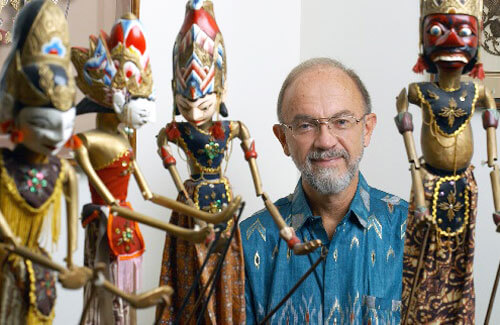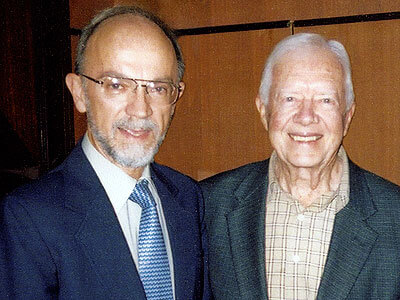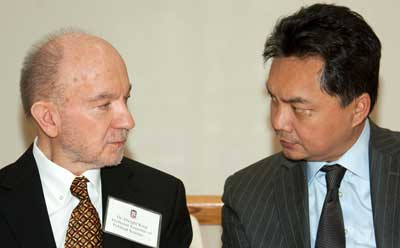
Political scientist Dwight King, an expert in Indonesia, collected numerous artifacts
from the country over the course of his career, including Indonesian puppets.
In 1978, the Department of Political Science hired Dwight King, an Indonesian specialist from Connecticut College.
Clark Neher had been teaching political science and Thai studies at NIU for nearly a decade, and the two Southeast Asian scholars soon became fast friends as colleagues, neighbors and as companions on early morning runs four times a week, Neher recalled.
King died Sept. 10 of complications from an eight-year battle with Lewy Body disease. He was 72.
He received his bachelor’s degree in 1964 from Goshen College, a bachelor’s in sacred theology from Harvard University in 1968, a master’s from Johns Hopkins University’s School for Advanced International Studies in 1970, and his Ph.D. in 1978 from the University of Chicago.
Fluent in Bahasa Indonesia, he was awarded a Fulbright early in his career, followed by other fellowships and awards, and later served as a visiting scholar in Thailand and Indonesia. He published widely on Indonesia, authoring journal articles, book chapters and monographs. He also served as an adviser to the U.S. Agency for International Development, the Ford Foundation, the World Bank and the Mennonite Central Committee.
Toward the end of his career, King directed the Center for Southeast Asian Studies from 2006 to 2008 after which he retired.
As a professor, King taught comparative politics and policy and the political economy of development and development administration. In addition to teaching, he twice served as the Political Science Department’s director of graduate studies, overseeing the advanced degrees of both international and American students over several decades. His numerous students from Indonesia went on to prominent positions in government, academia, think tanks and non-governmental organizations.
“Dwight contributed so much to the Department of Political Science, both as the department’s director of graduate studies and as a renowned scholar of Indonesian politics,” Chair Matthew Streb said.

Dwight King in an undated photo with former president Jimmy Carter, whose Carter Center was integral in Indonesia’s developing democracy after the end of Suharto’s New Order regime in 1998.
“His greatest contribution came from the relationship that he developed with his graduate students. Students literally came from around the globe to work with Dwight and he kept in touch with many long after they graduated,” Streb added. “He was demanding, yet compassionate. I have never heard one of his graduate students speak about him in anything less than glowing terms. His interaction with graduate students is a model for the rest of us.”
Growing up in a Mennonite family in Hutchinson, Kan., greatly influenced King’s keen interest both in the developing world and in recruiting and teaching promising students from Indonesia, Neher said.
“He was incredibly steady and thoughtful, partly a result of his Mennonite training,” Neher said. “He was a superb mentor and worked diligently on behalf of individuals. His home was often a central location for parties and receptions.”
News of King’s death traveled around the world almost immediately, Neher said. “When he died, within 20 minutes Facebook was deluged with messages from Indonesia,” he said. Nearly all were from King’s former students.
Philips Vermonte (Ph.D. political science, 2011), head of the political and international relations department for the Centre for Strategic and International Studies in Jakarta, recalled the professor affectionately known by his Indonesian students as Pak King.
“He didn’t rush in making conclusions. He could see a problem comprehensively and was patient about his students’ development. The way he led a discussion felt more like a colleague than a professor,” Vermonte said in a Sept. 12 article in The Jakarta Post.

King chats with Indonesian Ambassador Dino Patti Djalal, who presented the professor with a special award from the Indonesian government.
It was for his commitment to students, and for his contributions to Indonesia’s development including service from 1999 to 2007 as an adviser and election monitor in Indonesia and East Timor for The Carter Center, that King received a lifetime achievement award from the Indonesian government in 2012. Indonesian Ambassador to the United States Dino Patti Djalal came to DeKalb to present King with the “Award of Distinction for Lifetime Contribution to the Understanding of Indonesia” at a reception at the Holmes Student Center.
Prior to his illness, King was also known on campus as an accomplished athlete on the faculty. He bicycled to work rain or shine, as well as throughout the Rocky Mountains and parts of the Midwest. He ran in marathons, swam regularly and was a premier tennis player.
King’s legacy will live on at NIU through the Dwight Y. King Endowment for the Center for Southeast Asian Studies, a fund King established through the NIU Foundation after his retirement to be activated after his death. The fund will provide scholarships for international students, in particular those from Indonesia, to attend NIU to pursue an advanced degree involving substantial research in the country to which King devoted his entire professional life.
King, who died at the Oak Crest Retirement Center in DeKalb, is survived by his two children, Jonathan and Sarah, three grandchildren, two sisters, a brother and numerous nieces and nephews. A memorial service will be held at 1:30 p.m. Sunday, Oct. 4, at First Congregational United Church of Christ, 615 N. First St., in DeKalb. In lieu of flowers, donations can be made to the Oak Crest Good Samaritan Fund, 2944 Greenwood Acres Drive, DeKalb, IL 60115.
